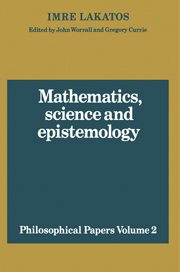Book contents
- Frontmatter
- Contents
- Editors' introduction
- PART 1 PHILOSOPHY OF MATHEMATICS
- PART 2 CRITICAL PAPERS
- PART 3 SCIENCE AND EDUCATION
- 12 A letter to the Director of the London School of Economics
- 13 The teaching of the history of science
- 14 The social responsibility of science
- References
- Lakatos bibliography
- Indexes
14 - The social responsibility of science
Published online by Cambridge University Press: 09 January 2010
- Frontmatter
- Contents
- Editors' introduction
- PART 1 PHILOSOPHY OF MATHEMATICS
- PART 2 CRITICAL PAPERS
- PART 3 SCIENCE AND EDUCATION
- 12 A letter to the Director of the London School of Economics
- 13 The teaching of the history of science
- 14 The social responsibility of science
- References
- Lakatos bibliography
- Indexes
Summary
Respect for Truth, Russell tells us, is of Judaeo-Christian origin. Science respects truth no more than Catholicism; they differ only about how to recognize truth. The authority for science is reason and experience, the authority for Catholicism is revelation. But Galileo and the Inquisition had one common ground: they both craved for Truth articulated in propositions whose truth and falsehood was independent of the person who uttered them or of the machine that printed them. In this sense, Catholics and scientists alike come under what Dr Ravetz calls the ‘classical’ tradition. They all pursued truth and differed only on how to evaluate propositions with respect to their truth or falsity, or with respect to their probability.
Science achieved its autonomy in a long struggle with the Church – leaving the Church and nonscientists to decide matters about God, morality, politics, but maintaining a rule of reason and experiment as far as the factual truth about the Universe is concerned. Scientists and philosophers disagreed about the relative proving power of intellect and experience and about the general criteria by which to judge scientific – and especially rival scientific – theories; but in specific cases they finally seemed to reach very good agreement: all scientists, for example, agree that Einsteinian mechanics is better than Newtonian.
The values and methods of appraisal of science have continually come under attack from the outside. Sceptics, like Hume, questioned its exaggerated claims to certain knowledge. Some, like Popper, questioned its claims even to (provably) probable knowledge. But science could live very well with the sceptics' criticisms as long as these sceptics did not present a rival set of aims and standards.
- Type
- Chapter
- Information
- Mathematics, Science and Epistemology , pp. 256 - 258Publisher: Cambridge University PressPrint publication year: 1978
- 3
- Cited by



